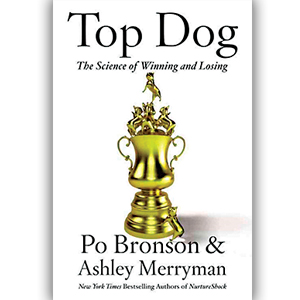
Top Dog: Feeding the Competitive Fire
 “We all make mistakes, but we need to learn from them and move on,” argue Po Bronson and Ashley Merryman. “You can own a mistake, or the mistake will own you,” they explain in their latest title, Top Dog: The Science of Winning and Losing. While the book doesn’t offer parents specific tips for helping their children deal with competition, it certainly provides a persuasive argument against the participation-trophies-for-everyone movement that’s become so popular.
“We all make mistakes, but we need to learn from them and move on,” argue Po Bronson and Ashley Merryman. “You can own a mistake, or the mistake will own you,” they explain in their latest title, Top Dog: The Science of Winning and Losing. While the book doesn’t offer parents specific tips for helping their children deal with competition, it certainly provides a persuasive argument against the participation-trophies-for-everyone movement that’s become so popular.
One of the most memorable chapters is on the difference between winning and playing-not-to-lose. You know what they mean – the idea that a person is so focused on preventing failure that they are unable to play to win. According to Bronson and Merryman, this is problematic because “new ideas can’t come from a playing-not-to-lose mindset, where the inhibition system is hyperactive. Creativity requires disinhibition: it requires turning off the internal censors in order to allow brainstorming and idea generation.”
A perfect example of how this playing-not-to-lose mindset relates to a school setting occurred at the University of Texas. Top Dog explains students were given a series of GRE problems at the beginning and end of the semester. The difference being that initially students gained points for every correct answer, whereas in the end, they lost points for every wrong answer. While you wouldn’t think this would make a big difference, it did. Bronson and Merryman describe how the students were more focused on avoiding mistakes than gaining new knowledge. Ultimately, the authors argue, “When [the students] first arrived on campus as freshman, they wanted to get an education that would last a lifetime. But by the end of the semester, they were fixated on learning just what they would need to get through the final exam.”
My other favorite chapter was about how competition manifests itself in the arts. Bronson and Merryman encourage readers to think of a room full of young artist-apprentices all vying for the master’s approval. According to Top Dog, “Da Vinci believed artists thrived under the pressure of such a competitive environment.” Apparently, the artists who recommended Michelangelo to paint the Sistine Chapel did so because they believed his failure would result in his rival, Raphael, painting it. Luckily, Michelangelo rose to the occasion.
According to Bronson and Merryman, if we want our children to succeed in life, the ultimate competitive environment, then we need to cultivate agency. The authors explain it as “the capacity to act independently, to make one’s own free choices, and to make decisions quickly.” The idea being that it’s not enough to have creative ideas; rather people need to have the courage to risk rejection if they are ever going to succeed.
When Bronson and Merryman describe the childhoods of highly creative adults, it does not involve a significant amount of art training as children. “What they had instead were childhoods where they learned to trust their own judgment without anyone’s input. They grew up learning to be comfortable with conflict, contradiction, and opposition,” argue Bronson and Merryman.
Parents might also enjoy the chapters on “The ‘Roid Rage of Chess” and “The Hierarchy of Teams,” as both offered some fascinating insights into how our mindset towards our interactions with others impacts our success. What it comes down to, Top Dog is the perfect antidote for parents, like me, who are sick and tired of their kids getting ribbons just for showing up. I’m ok with the short-term implications of my child’s hurt feelings if it means success in the long-term. For as Bronson and Merryman so artfully convey, “Competitive fire will flourish when long-term goals are high, and when it’s accepted that risks and mistakes go hand-in-hand, and we are free to let ambition reign.”
Follow @WinterhalterV on Twitter for updates on blog posts or like Parenting by the Book on Facebook.
Read my other blog Befriending Forty.






